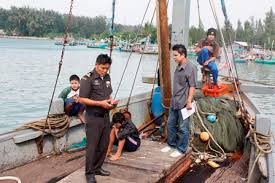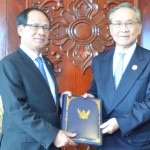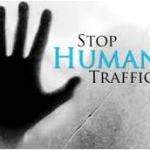
Thailand’s leading English-language daily newspaper published an editorial last week insisting that the government “has made real achievements against the slave trade” and that the “difference in a year [has been] astounding, ” as the Ministry of Labor was compiling its information on the human trafficking and labor abuse situation for submission to the United States Department of State.
“The trends are all in one direction. The [government] directives of 20 months ago to clean up human trafficking continue to advance,’’ the Bangkok Post wrote in its February 24 editorial entitled “Slave trade gains are real.” The Post is an independent, private-sector newspaper free of any government control, and has criticized both the government and businesses in the past for failure to solve the human trafficking problem.
“Two years ago, after far too much vacillating and fretting, Thailand was placed on the bottom tier of world nations for dealing with human trafficking. The violations of human and civil rights were too uncaring. In some cases, lured by the money available in this odious trade, [officials] were corrupt. To its credit, the current government that took over in May 2014, changed that attitude,” the Post wrote.
In mid-2014, the State Department placed Thailand on Tier 3, the lowest ranking, in its annual Trafficking in Persons Report. Tier 3 contains countries whose governments are not making significant efforts to comply with the minimum standards the State Department has set for fighting human trafficking. Previous Thai administrations had been warned that if they did not improve their efforts, the Kingdom could be downgraded.
The government of Prime Minister Prayut Chan-o-cha, which took power after the assessment by the State Department for 2014 was already completed, responded to the downgrade by elevating the fight against human trafficking to an urgent national priority and launching a comprehensive set of measures to tackle the problem.
Those broad-based measures have taken time to be implemented and become effective, and some are still being adjusted and fine-tuned. But positive results can already be measured in the arrests of over 200 members of transnational trafficking syndicates – including members of the military, police, politicians, bureaucrats, businesspeople and career criminals – and the registration of more than a million migrant workers.
They also include greater protection for victims, agreements on prevention with neighboring countries, and a raft of actions to clean up the long-neglected and poorly regulated fishing and seafood industries.
At the same time, the Ministry of Labor has been compiling data under 13 categories to provide a clear picture of Thailand’s progress to the U.S. The categories include legislation on labor trafficking, management of employment agencies and punishments for traffickers. The report is also to include the results of labor inspections and observations of fishing boats.
The final version of Thailand’s report will be submitted to the U.S. at the end of March.
For more information and updates about Thailand’s policies and actions against trafficking in persons and related issues, visit www.thaianti-humantraffickingaction.org




